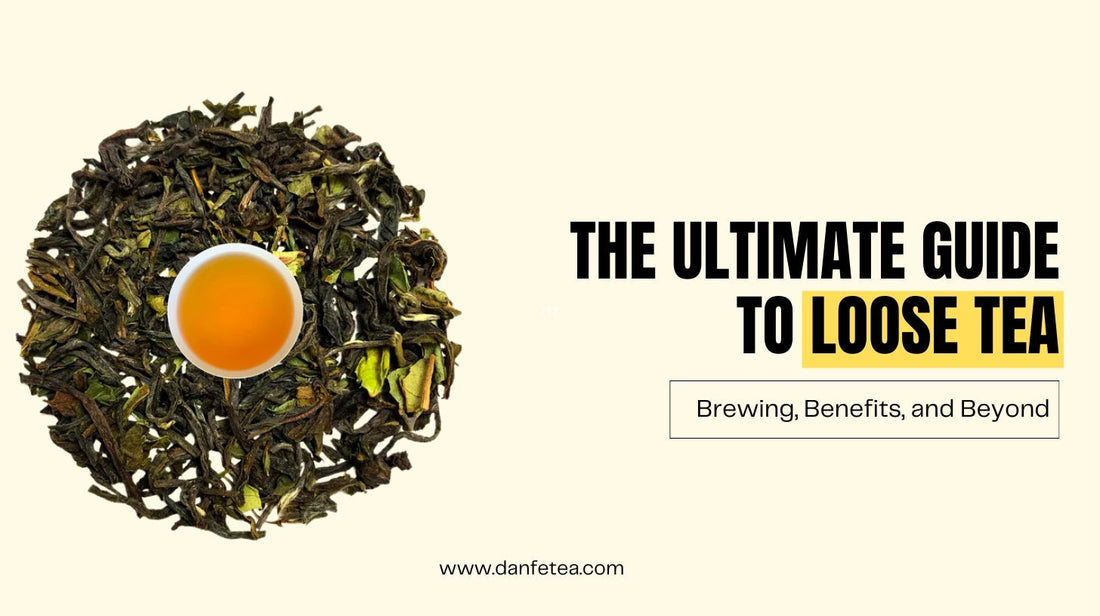
The Ultimate Guide to Loose Tea: Brewing, Benefits, and Beyond
Why Choose Loose Tea Over Tea Bags?
Tea bags may be convenient, but they often contain broken leaves, dust, and lower-quality blends. Loose tea, on the other hand, uses whole or larger leaves, allowing for:
- Better Flavor – fuller, smoother, less bitter taste.
- More Nutrients – antioxidants like catechins are better preserved.
- Customizable Strength – you control the leaf-to-water ratio.
-
Sustainability – less packaging waste compared to tea bags.
Types of Loose Tea
Loose tea comes in many varieties, each with its unique flavor and health profile:
- Green Tea - Light, grassy, high in antioxidants.
- Black Tea - Bold, malty, higher in caffeine.
- Oolong Tea - Between green and black, smooth and aromatic.
- White Tea - Delicate, minimally processed, low caffeine.
- Herbal Tea (Tisanes) - Caffeine-free blends like chamomile, spearmint, lemongrass, or tulsi.
How to Brew Loose Tea (Step by Step)
Brewing loose tea is simple, but precision matters:
- Measure - Use 1 teaspoon (2 grams) per 8 oz cup.
- Heat Water - Ideal temperature varies:
- Green tea: 75–85°C (170–185°F)
- Black tea: 95–100°C (200–212°F)
- Herbal teas: 95–100°C (200–212°F)
- Steep - 2–5 minutes, depending on the tea. Over-steeping makes it bitter.
-
Strain & Enjoy - Use a tea strainer, infuser, or teapot with a built-in filter.
Tip: Re-steep high-quality leaves 2–3 times to discover new flavor notes each brew.
Does Loose Tea Have More Caffeine?
Many tea drinkers ask: “Does loose tea have more caffeine than tea bags?”
The answer: Yes, usually. Loose tea uses larger, fresher leaves, which means a higher caffeine content than most standard bagged teas.
- Green tea: 20–45 mg per cup
- Black tea: 40–70 mg per cup
- Herbal tea: Naturally caffeine-free
For a full breakdown, see our detailed blog: Does Loose Tea Have More Caffeine?
Tips for Sweetening and Flavoring Loose Tea
Loose tea is naturally flavorful, but you can enhance it with natural add-ins:
- Sweeteners - Honey, maple syrup, or stevia instead of sugar.
- Citrus - Lemon or orange slices brighten green and black teas.
- Herbs - Mint, basil, or lemongrass for a refreshing twist.
- Spices - Cinnamon, cardamom, or ginger for warmth.
-
Fruit - Fresh berries or peach slices for a fruity iced tea.
Loose Tea Recipes & Variations
1. Iced Loose-Leaf Tea
- Brew tea double strength (2 tsp per cup).
- Pour over ice.
-
Add lemon, mint, or honey for a refreshing twist.
2. Green Tea Latte
- Brew green tea and whisk with steamed milk.
-
Sweeten lightly with honey or vanilla.
3. Detox Tea with Lemongrass & Spearmint
- Combine green tea with fresh lemongrass and mint.
-
Steep 5 minutes for a soothing digestive tea.
Health Benefits of Loose Tea
Loose tea offers powerful wellness perks:
- Green Tea - Boosts metabolism, supports fat loss, and promotes glowing skin.
- Black Tea - Improves focus and heart health.
- Spearmint Tea - May balance hormones and reduce bloating.
- Lemongrass Tea - Supports sleep, immunity, and detox.
- Tulsi (Holy Basil) Tea - Reduces stress and inflammation.
Conclusion: Make Loose Tea Your Daily Ritual
Loose tea isn’t just a drink it’s a ritual of wellness, flavor, and mindfulness. Whether you enjoy a calming jasmine, a bold black tea, or a caffeine-free herbal blend, choosing loose tea gives you a fresher, healthier, and more enjoyable cup every time.
If you’re ready to upgrade your tea experience, start with premium Himalayan teas like Mt. Pumori Green Tea or Nepal Jasmine Green Tea at DanfeTea.com.
FAQs
Q1: Can you reuse loose tea leaves?
Yes, high-quality loose tea can be steeped 2–3 times.
Q2: Is loose tea healthier than bagged tea?
Yes. It contains more antioxidants and fewer additives.
Q3: How should I store loose tea?
Keep in an airtight container, away from heat, light, and moisture.
Q4: Does loose tea expire?
Tea doesn’t “go bad” but loses flavor after 12–18 months.










